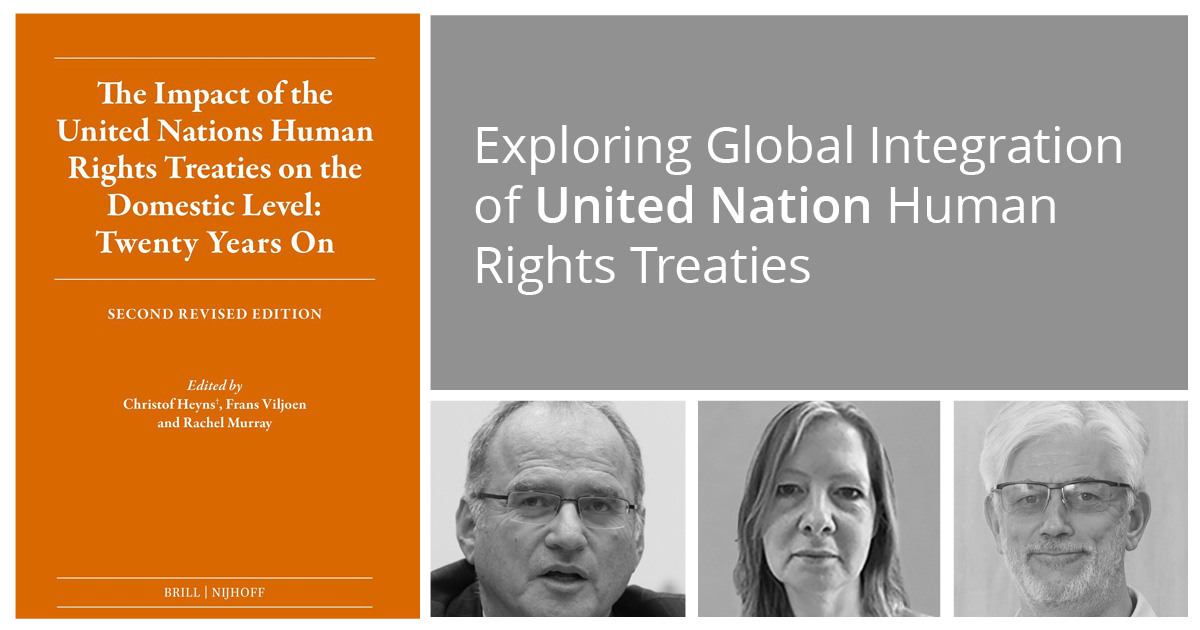On 15 May 2024, the Centre for Human Rights, Faculty of Law University of Pretoria, in collaboration with the Norwegian Centre for Human Rights, University of Oslo, co-organised a webinar for academics, NGOs and civil society organisations on the implementation of the UN treaty system within domestic legal systems across the world.
This webinar forms part of a broader strategic project by the two Centres to foster research-based education through academic mobility and measuring the domestic impact of the core UN human rights treaties.
The webinar covered three specific topics. The first was a launch and discussion of the open-access book The Impact of the United Nations Human Rights Treaties on the Domestic Level: Twenty Years On – Second Revised Edition | Brill, edited by the late Professor Christof Heyns together with Professors Frans Viljoen and Rachel Murray. Out of the 20 countries captured within the book, four countries from four of the five United Nations regions were selected, namely; Colombia, Nepal, Poland and Spain. Rodrigo Uprimny, Ravi Vyas, Katarzyna Sekowska-Kozlowska and Carlos Villán Durán discussed the impact of the UN human rights treaties within these countries. (A follow-up webinar on 23 May 2024 will focus on the African region.)
Rodrigo Uprimny emphasised the implementation of UN human rights treaties within Colombia, which have a special status as compared to other treaties, making them self-enforcing. This is due to the adoption of the 1991 Constitution, in which article 93 establishes that human rights treaties have legal pre-eminence in Colombia’s domestic order over other treaties and that constitutional rights have to be interpreted in conformity with the human rights treaties ratified by Colombia. He also discussed how the Inter-American human rights system has had a greater impact within Colombia compared to the UN treaty system. The UN system’s impact has been on issues not covered at the domestic or regional level, such as the justiciability of socio-economic rights. In this domain, Colombian law has been influenced by the jurisprudence of the Committee on Economic, Social and Cultural Rights.
Ravi Vyas singled out the impact of the Convention Against Torture and Other Cruel, Inhuman or Degrading Treatment or Punishment (CAT) within Nepal's domestic legal system, enumerating the progress made on implementation. These included the prohibition of torture within Nepal’s Constitution and how this has safeguarded individuals' right to redress before the courts. He also highlighted the challenges to the implementation of CAT within Nepal, which include issues of political instability and limited resources for the operationalisation of national human rights institutions.
Katarzyna Sekowska-Kozlowska addressed Poland’s role in the drafting and implementation of the UN Convention on the Rights of the Child. She further addressed Poland’s non-accession to the International Convention on the Protection of the Rights of All Migrant Workers and Members of Their Families (CMW) and the International Convention for the Protection of All Persons from Enforced Disappearance due to the provisions of these treaties being in contravention to Poland’s domestic law. The non-ratification of the CMW is a position reflected in most European Union member states.
Carlos Villán Durán highlighted Spain’s non-accession to the CMW and the present challenge presented by the 2000 Aliens Act of Spain, which contains discriminatory provisions on how foreigners can enjoy fundamental rights and freedoms, which Article 13 of the Constitution of Spain allows.
The second part of the webinar was a panel discussion on the role of national human rights institutions (NHRIs) of South Africa and Norway in facilitating the impact of international human rights law. The panel included one representative each from the Norwegian Human Rights Institution, the South African Human Rights Commission, and the South African Commission for Gender Equality. Panel members addressed questions from participants on best practices on how each commission remains financially independent of the state to prevent non-interference in their duties as well as how each machinery works for the promotion and protection of human rights.
The third part discussed the impact of the UN human rights treaty system on two African countries—Togo and Burundi—not covered in the book (The Impact of the United Nations Human Rights Treaties on the Domestic Level: Twenty Years On). Two students of the class of 2024 of the Human Rights and Democratisation programme at the Centre for Human Rights, University of Pretoria, addressed this topic. They each spoke on the implementation of the UN treaty system within their respective home countries.
The webinar concluded with speakers answering questions from the participants on each country's various implementation strategies and the challenges faced by successive governments within their respective legal systems.
Frans Viljoen thanked participants for their time and also announced the forthcoming webinar on 23 May 2024 (11:00 SAST), which focuses on the implementation of the UN treaty system in Egypt, Senegal, South Africa and Zambia.
Masters’ students of the class of 2024 Human Rights and Democratisation programme, as part of their broader mandate within the Litigation and Implementation Human Rights Clinic at the Centre for Human Rights, University of Pretoria, assisted in organising this webinar.
Watch Webinar
For more information, please contact:

Tel: +27 (0) 12 420 3810
Fax: +27 (0) 86 580 5743
foluso.adegalu@up.ac.za

Tel: +27 (0) 12 420 3228
Fax: +27 (0) 86 580 5743
frans.viljoen@up.ac.za


